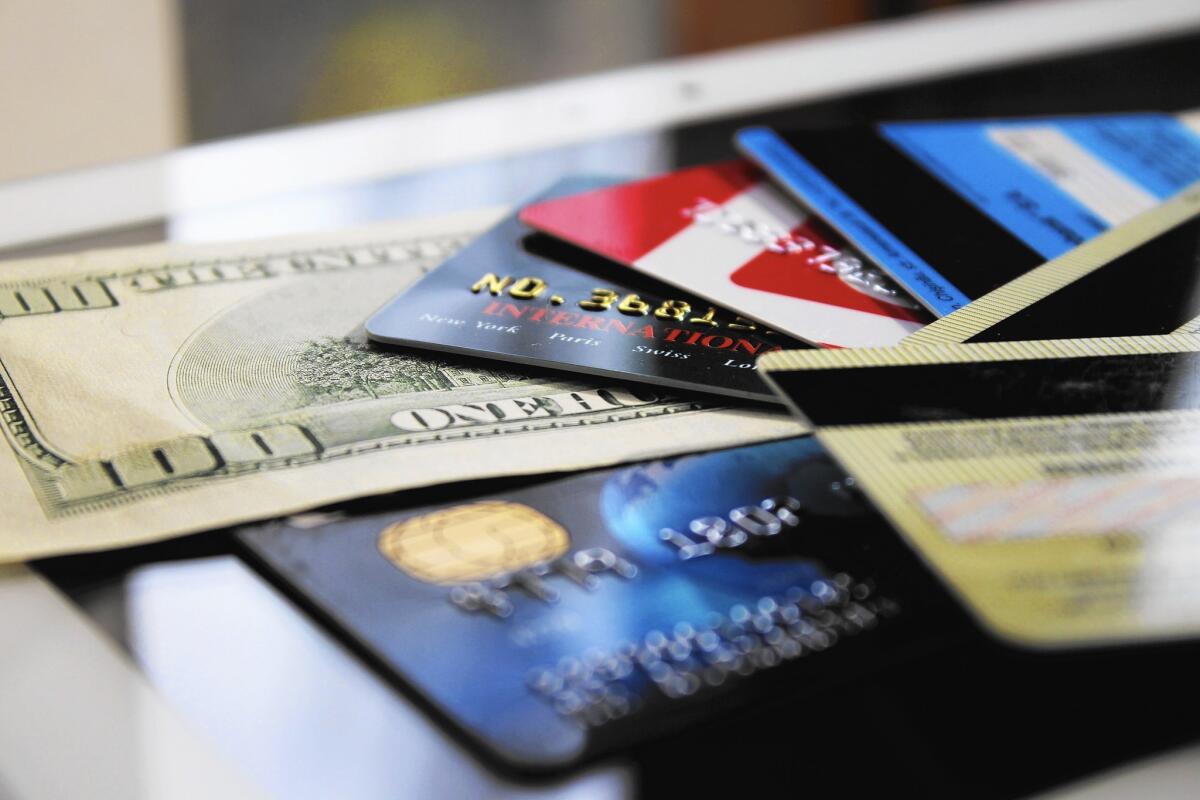How to get back on track if you’re drowning in debt

- Share via
Getting out of debt is much harder than getting into it. But you can do it — and along the way, you’ll rid yourself of a lot of stress.
Countless people find themselves drowning in debt simply because they can’t control their spending. If this sounds familiar, try tracking everything you buy for a month, including all those “little” items that cost just a few dollars. Once you see how those purchases add up, you’ll realize how important it is to lay out a budget and stick to it.
Understanding how much you actually spend is a good first step, but that alone won’t get you out of debt. The following strategies for managing different types of expenses — and bringing in some extra income — can you help you reach a happy, debt-free future.
Control your credit card usage
If credit card debt is the problem, take these steps right away:
Cut up your cards: Save one card for use in emergency situations. Cut up all the others, and throw away the pieces.
Pay with cash: Only pay cash for purchases such as groceries, clothing and gas.
Attack high-interest debt first: Pay off the credit card with the highest interest rate first. Once this card is paid off, apply what you were paying on it to the card with the next highest rate.
Negotiate a lower rate: Negotiate your interest rate with your credit card companies. Your issuer will usually work with you if you say you’re going to transfer the balance to another card with a lower rate.
Cut some recurring expenses
Most people have recurring monthly expenses that can be eliminated, including:
Excess phone service: If you have a mobile and a landline, you probably don’t need both. Pick one and stop paying for the other.
Satellite/cable television: Consider disconnecting satellite or cable service and replacing it with a streaming service, such as Netflix or Hulu. You can get entertainment at a fraction of the monthly cost.
Keep an eye on your indulgences
We all have little indulgences we like to spend money on here and there, but we often don’t realize how much they add up.
Specialty coffee: Stopping by Starbucks on your way to work every morning is certainly a luxury you enjoy, but you could save $25 or more a week by making your own coffee at home.
Fast food lunches: If you work outside your home, chances are you buy lunch out at least a couple of days per week. These costs mount quickly. Even if you spend only $40 per month eating lunch out, that’s $40 that could go to your savings account or toward a credit card payment.
Bring in extra income
When you lose control of your finances, getting out of debt requires serious action.
Take a second job: No one wants to work 16 hours per day, but if that’s what it takes for your family to thrive financially, then it must be done — at least temporarily. It may be that working an additional, part-time job for just 20 hours or less per week is all that’s necessary to help you out financially.
Sell things you don’t use: Many of us keep things we no longer need in the basement or storage shed. Sell any item you haven’t used within the last year online or have a garage sale.
Sell your (extra) car: If you’re a two- or three-car household, chances are you could make do with one less car. Consider selling one if it isn’t a necessity.
Reduce debt — and stress
It requires work and a commitment to doing what it takes to reduce your expenses-to-income ratio. Once you make that commitment, you’ll find that your bank account grows and your stress level decreases.
Pamela J. Sams, CRPC, is a financial advisor and president of Jackson Sams Financial Services in Herndon, Va. She is an advisor at NerdWallet, a personal finance site.
More to Read
Inside the business of entertainment
The Wide Shot brings you news, analysis and insights on everything from streaming wars to production — and what it all means for the future.
You may occasionally receive promotional content from the Los Angeles Times.










